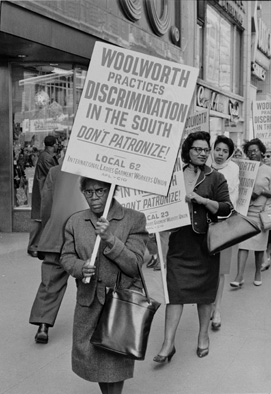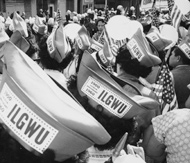

History of the ILGWU
Criticism of the ILGWU

The ILGWU's international leadership was sometimes taken to task for not being sufficiently representative of the union membership. Whether it was in regard to gender, race, the union's focus on New York City, or the relationship of union staff to the central office, the treatment of ILGWU members and staff by the international's leadership was subject to considerable criticism.
In the union's early years, this disparity was primarily gendered. While on the local level women served in office on local union boards or as business agent, often men were managers of these international affiliates. Fannia Cohn, who had been an organizer and later an important figure in the growth of international's educational department, was also the first female Vice President in the ILGWU, and later, organizer Rose Pesotta was elected a Vice President of the ILGWU. These women were exceptions to the tacit rule, and Pesotta was especially vocal in her disapproval of the union's leadership. The disproportionate representation of men in leadership of the ILGWU that began in the union's early years continued throughout the union's history.
Over time and especially in the post-war period, the racial demographics of the union changed dramatically, and to the relative absence of women in international leadership was added the relative absence of racial minorities in positions of power within the union. Despite the union's work to support efforts of the civil rights movement, few African Americans or Puerto Ricans were in positions of power within the union, though these two groups comprised a growing constituency within the ILGWU. What brought national attention to the ILGWU in this regard was the NAACP's support of Ernest Holmes' complaint against Local 10 that he had been denied membership in violation of anti-discrimination law. By 1962, the case had escalated to the point where the House Committee on Education and Labor held hearings on the ILGWU's operations.
The ILGWU's reputation as a progressive force in American organized labor was further tarnished by the divisive issue of the right of union staff to organize. Clerical workers of the ILGWU were organized as Local 153 of the Office Employees International Union, but other workers of the ILGWU were not unionized. When organizers and other staff sought to organize themselves into the Federation of Union Representatives (FOUR), President David Dubinsky denounced the effort of the workers and saw to it that the ILGWU did not recognize the union.
Thus, while the union was a major force in organized labor and helped to make remarkable gains for its members in the arenas of collective bargaining, workplace safety, and social unionism, the ILGWU's governance of itself and Dubinsky's presidency laid the union open to a variety of charges about its commitment to and realization of union democracy.


